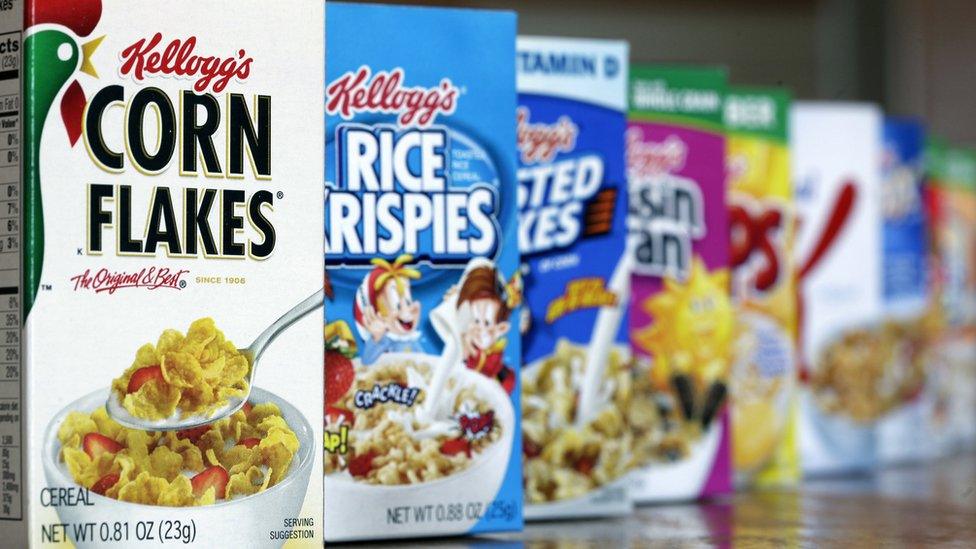Trump presidency: Opponents boosted by 'rage donation'
- Published
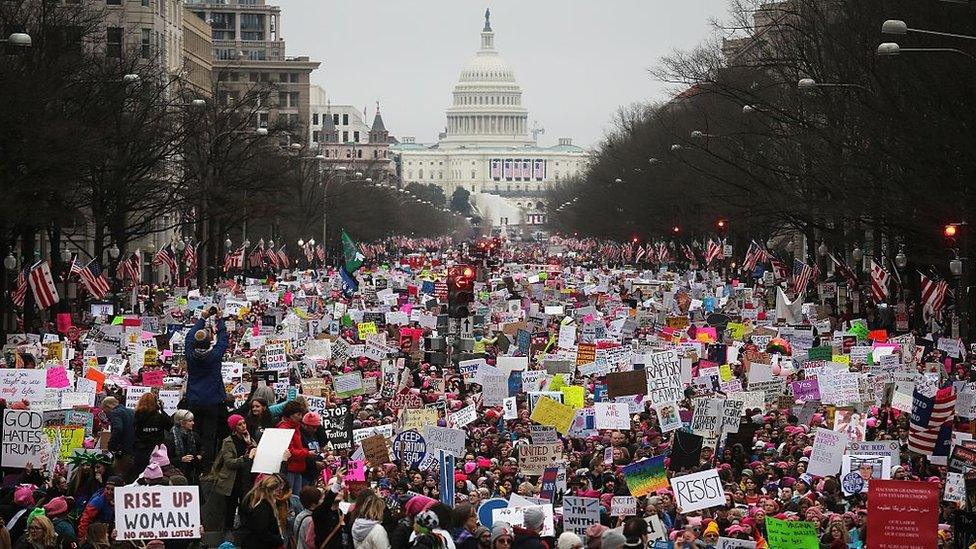
Since his first day in office, Mr Trump has faced angry opposition - and it's making his opponents money
Donald Trump's adversarial style during the election divided American voters like few campaigns in recent years.
The president himself has referred to "my many enemies" - but it seems they're getting a substantial boost from the new president.
Organisations that investigate, oppose, or lampoon the commander-in-chief are seeing a surge in support, in what's been dubbed "rage donation".
From civil rights to media types, the effect is widespread.
Reproductive rights
Planned Parenthood advocates for women's reproductive rights, including abortion - to which Mr Trump and Vice-President Mike Pence are both opposed.
Cecile Richards, who leads the family-planning group, told the BBC more than 400,000 people had donated since the election - "an unprecedented outpouring of support" - some of which has been given jokily in Mike Pence's name.
But, she said, no level of donations would be able to match the federal funding the group receives - something which may now be under threat.
"We will never back down, and we will never stop providing the care our patients need. These doors stay open, no matter what," she said.
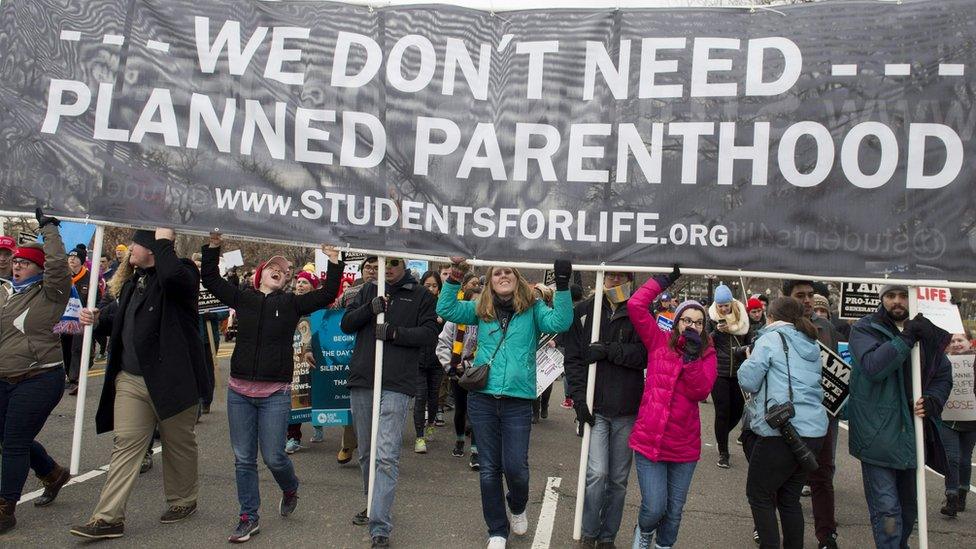
Pro-life supporters in the March for Life received open messages of support from both the president and vice president
The Centre for Reproductive Rights, meanwhile, is trying to raise $1m, external in Mr Trump's first 100 days
"We've had thousands of new donors in the last three months, many of whom have signed on to be monthly sustainers - donors who will be with us for the long haul," a spokeswoman said.
Environmental groups
One of American's biggest environmental protection groups, the Natural Resources Defence Council (NRDC), was singled out by popular comedian John Oliver late last year when he called on his viewers to donate, external following the election.
Since then, "we have seen an incredible response from the public," a spokeswoman said.
The "huge spike" continued through November and December, she said, slowing slightly in early January - before picking right back up at the inauguration.
"It's definitely driven by concern over President Trump's anti-environmental rhetoric and actions," the NRDC said.
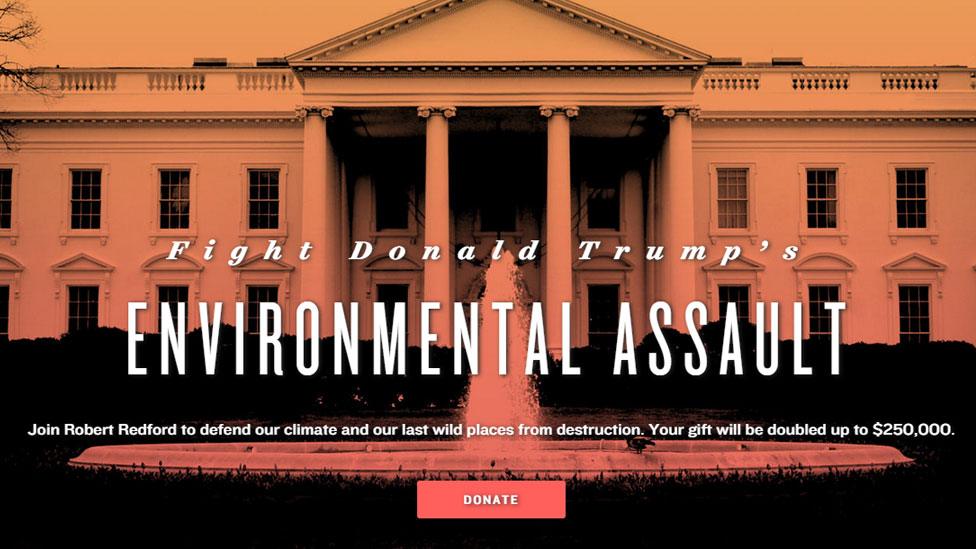
The Sierra Club, another major environmental group, reported 11,000 new monthly donors, external in the days following the election - nine times its previous record.
Saturday Night Live (and Alec Baldwin)
It's not just charities and fundraising that are seeing a positive bump from Trump. This week, it emerged that the long-running satire show Saturday Night Live was celebrating its highest ratings in decades.
Its numbers have grown by 22% overall - to 10 million viewers, the highest since 1995, according to Variety, external.
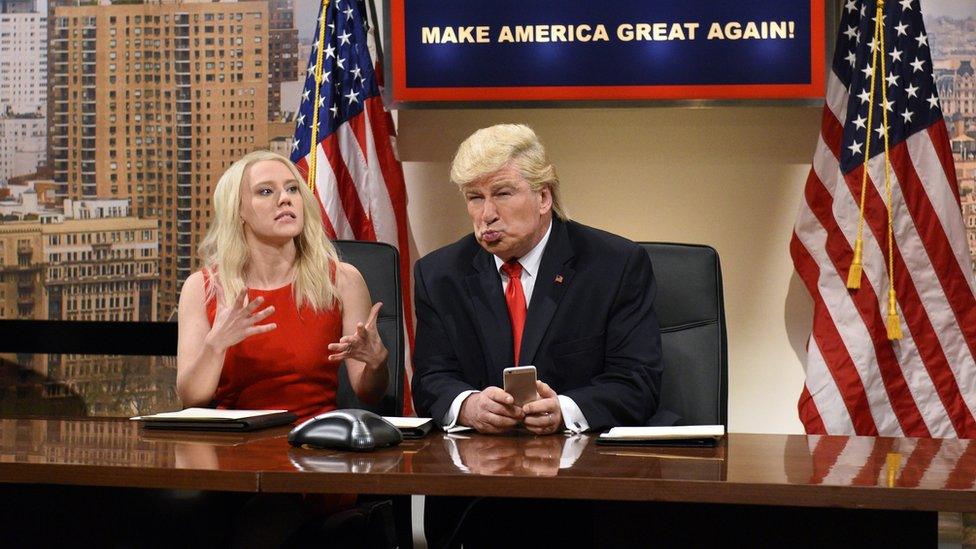
Alec Baldwin's parody of Trump has become a weekly fixture on the revived SNL
Alec Baldwin's portrayal of Mr Trump, which became wildly popular during the campaign, is now a weekly staple.
Strident Trump critic Stephen Colbert also beat his late-night rival, Jimmy Fallon, for the first time in years in recent ratings, external - though there's not yet enough evidence to link late-night show ratings to politics.

You may also like ...

Civil liberties groups
Perhaps the biggest success story comes from the American Civil Liberties Union (ACLU).
In a single weekend - as they fought a legal battle against the president's controversial immigration order - the group clocked up $24m (£19.1m) in donations, six times what it usually receives in an entire year. The huge amount prompted the rights group to turn to Silicon Valley for help managing the funds.

The ACLU was inundated with record donations after it blocked part of Mr Trump's executive order, days into his term
Groups like the National Association for the Advancement of Colored People (NAACP), the Southern Poverty Law Center, and the National Immigration Law Center have also benefited from social media campaigns.
Comedian Josh Gondelman, for example, felt uncomfortable with Mr Trump's close ties to the Patriots American football team. So he came up with the idea of donating $100 to the NAACP, external every time his team scored a touchdown during the Super Bowl.
Coupled with a social-friendly hashtag (#AGoodGame), the idea took off, and brought in thousands of dollars in donations for civil rights groups across the US.
The media
President Trump likes to tweet about, external the ("dishonest, lying") media. Most news outlets would say they don't oppose the president - but by nature, question and hold authority to account.
But amid outcry over "alternative facts" and talk of non-existent massacres, many are reporting more readers and subscriptions.
Non-profit public interest news organisation ProPublica said it had seen "a dramatic increase in donations, beginning late on election night".
Donor numbers swelled from 3,400 in all of 2015 to more than 26,000 in 2016, the organisation's president Dick Tofel said.
And recurring monthly donations jumped from $4,500 in October, just before the election, to $104,000 in January.
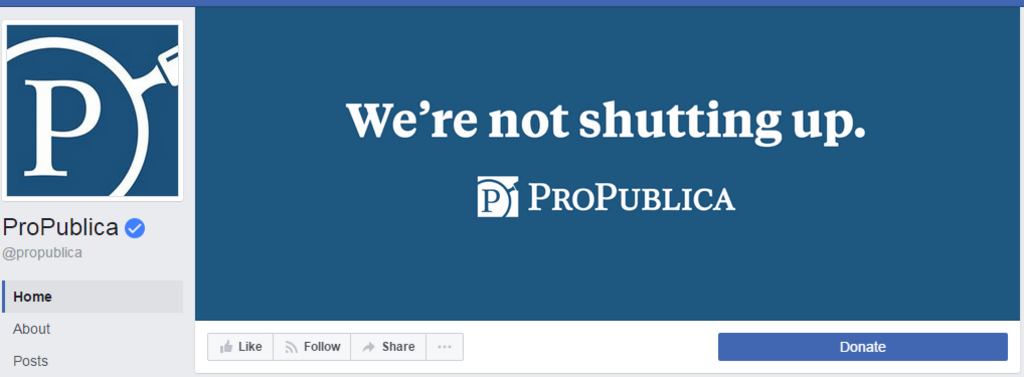
ProPublica adopted a new slogan after White House strategist Stephen Bannon suggested the press "keep its mouth shut"
"It seems that the election has caused a large number of people to want to take various forms of civic action. We're very flattered that many of them think of ProPublica - and investigative journalism in the public interest generally - in that connection," Mr Tofel said.
He stressed it was not clear that this was tied to "particular steps" taken by Mr Trump, but noted that donations picked up in January from inauguration day.
But the same bump was seen in private newspapers too.
The ("failing, wrong, so false") New York Times, which the president said should fix its "dwindling" numbers, actually added 276,000 digital subscriptions in the last quarter - the biggest jump since it brought in a paywall.
And the ("angry, boring") Washington Post reported almost 100 million users on its website in both October and November last year, "greatly exceeding previous traffic records".
Meanwhile, subscriptions to the Wall Street Journal jumped 300% on the day after the election, and it reported 70% growth in new digital subscriptions year on year.
What about Trump's supporters?
US voters chose Mr Trump - he won by a large margin in the electoral college system although he did not win the popular vote. Despite a slip in approval ratings, he appears to retain plenty of popular support.
It's still too early to know if his policies have had a positive impact, but his supporters remain steadfast.
Conservative news outlets such as Breitbart have surged in popularity, and Mr Trump's supporters have boycotted brands such as Kellogg's or Budweiser which are perceived to have taken a political stance against the president.

The president has directly criticised both people and companies through his Twitter account
Mr Trump's unique style of Twitter diplomacy, however, has had a direct negative impact on some companies.
Shortly after taking office, the new president tweeted that Boeing's costs for Air Force One were "out of control", dropping their stock value. A similar tongue-lashing on fighter jets dropped Lockheed Martin's stock by more than 4%.
Now, that effect already seems to be waning - as Fortune magazine pointed out, external, when the president struck out at retailer Nordstrom for dropping his daughter's fashion line, its stock actually rallied.
It may be that Mr Trump's rhetoric is no longer having the effect it once did, and is becoming a normal part of politics.
But with those opposed to the president's policies vowing they won't accept the new status quo, it remains to be seen if the "rage" effect will end up a steady revenue stream for the next four years.
- Published14 November 2016

- Published1 December 2016
